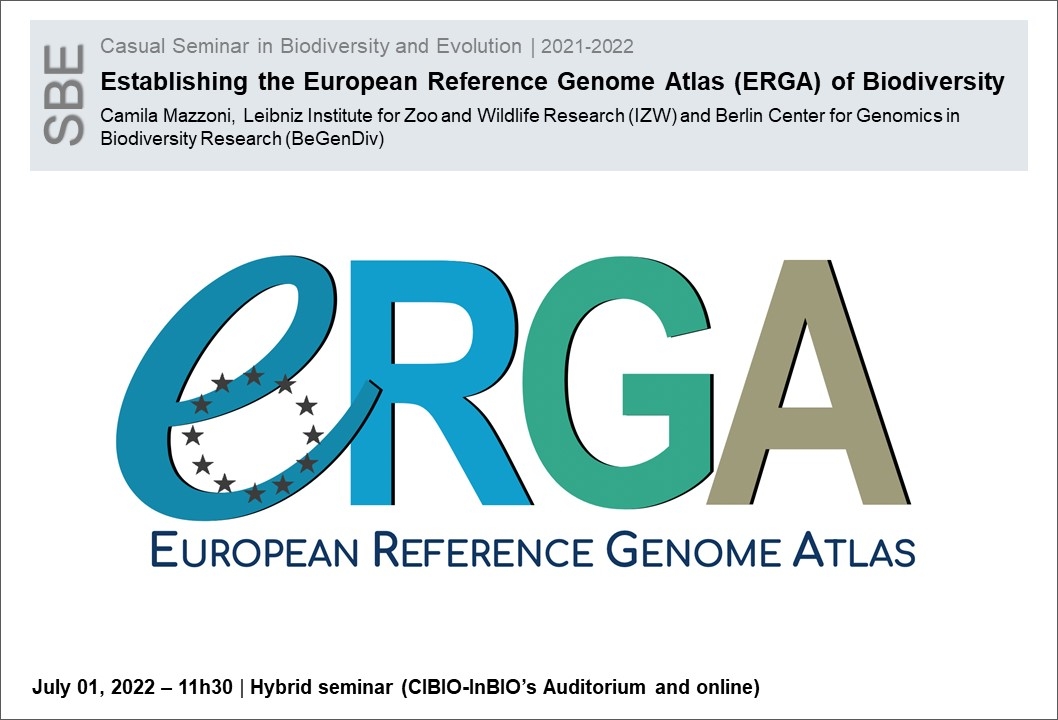Establishing the European Reference Genome Atlas (ERGA) of Biodiversity
01 Jul 2022 - Camila Mazzoni, Leibniz Institute for Zoo and Wildlife Research (IZW) and Berlin Center for Genomics in Biodiversity Research (BeGenDiv) | 11h30 | Hybrid seminar

CASUAL SEMINAR IN BIODIVERSITY AND EVOLUTION
Biodiversity is being lost faster than science is able to catalogue and study the species of our planet. New Genomic technologies can help us describe the genome sequence of virtually any living species, and unveil the most basic and essential information that forms an organism. Several BioGenome projects have started around the world in the last few years, and are getting under the umbrella of a network of networks known as the Earth BioGenome Project (EBP), which aims to sequence all complex life on Earth. In 2020, hundreds of scientists got together to form an European-wide initiative to support the EBP mission. The European Reference Genome Atlas (ERGA) is both a project and a network of projects, institutions and scientists. As a project, ERGA aims to sequence thousands of genomes of European critical biodiversity and to form an expandable sequencing and computational infrastructure, distributed across Europe. As a network, ERGA intends to connect projects, institutions and scientists as a synergistic hub of knowledge and resources exchange. The first major endeavour of ERGA has been a Pilot project that aimed to sequence at least one genome from every European country. The ERGA-Pilot has formed the basis of ERGA’s infrastructure, including the association of several sequencing centres, support from stakeholders, development of SOPs and an initial computational infrastructure to assemble, annotate and submit data to public repositories. The path paved by the ERGA-Pilot will be expanded by the next ERGA core project, the Biodiversity Genome Europe (BGE) ERGA stream, which was recently funded by the European Commission. The BGE project starts in September 2022 and will support the ERGA consortium in establishing a robust infrastructure to allow the network expansion and indirectly the sequencing of thousands of genomes. The establishment of ERGA will be formalised and consolidated in the near future, connecting all European countries in the mission to sequence its biodiversity.
Camila Mazzoni’s scientific career started by analysing evolutionary patterns of vectors of Leishmaniasis, in Brazil. After that, Camila moved to work on bacterial population Genomics, at a Max Planck Institute in Germany and at the University College Cork, in Ireland. The time coincided with the beginning of next-generation sequencing and Camila got involved in analysing some of the first Genomes produced for intra-specific analysis. Camila’s passion to Biodiversity-related questions led her to change fields, and in 2010, Camila joined the Leibniz Institute for Zoo and Wildlife (IZW) to help build a Genome Centre dedicated to Biodiversity in Berlin (BeGenDiv). For five years, Camila dedicated time to design and establish the Genome Centre, as the Bioinformatics leader. In 2015, Camila officially created the Conservation and Evolutionary Genomics research group, with a focus on threatened species. In 2021, she became the first chair of the European Reference Genome Atlas (ERGA), a consortium of hundreds of researchers aiming at sequencing genomes for the entire Biodiversity in Europe.
[Hosts: José Melo-Ferreira, Genomics of Evolutionary Change - EVOCHANGE and Paulo Célio Alves, Conservation Genetics and Wildlife Management - CONGEN]